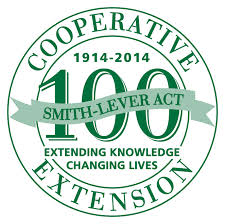 Virginians will celebrate the 100-year anniversary of Virginia Cooperative Extension and the important service it provides to the people of the commonwealth, following Gov. Terry McAuliffe’s declaration of May 8, 2014, as Virginia Cooperative Extension Day.
Virginians will celebrate the 100-year anniversary of Virginia Cooperative Extension and the important service it provides to the people of the commonwealth, following Gov. Terry McAuliffe’s declaration of May 8, 2014, as Virginia Cooperative Extension Day.
Congress passed the Smith-Lever Act on May 8, 1914, creating the Cooperative Extension Service, a state-by-state national network of educators who extend university-based knowledge to the people.
The governor’s proclamation:
Acknowledges Extension as a critical component of the three-part land-grant mission at Virginia Tech and Virginia State University that works in partnership with federal, state, and local governments to bring the research-based knowledge of land-grant universities to people where they live and work.
Recognizes that Extension works collaboratively with research and academic programs at colleges and universities across the U.S. to reach traditional and underserved audiences.
Acknowledges Extension’s role in translating science-based research for practical application through local and online learning networks where agents are uniquely available to identify emerging research questions, connect with university faculty members to find answers, and encourage the application of findings to improve economic and social conditions.
“While many things have changed over the past 100 years, we still work with people where they live and deal with the issues they face every day. We help them use the knowledge from the land-grant universities to improve their quality of life and economic prosperity,” said Edwin Jones, director of Virginia Cooperative Extension.
Faculty members located on two campuses, 107 county and city offices, 11 agricultural research and extension centers, and six 4-H educational centers provide educational programs in everything from family financial management and nutrition to agricultural best practices and food safety to small business development and leadership. In 2013, Extension programs reached more than 2.6 million participants statewide.
Jones acknowledges that Extension could not reach as many people as it does without the support of its talented volunteers. “Our volunteers help our educators deliver research-based solutions to Virginia’s homes, farms, businesses, and communities,” said Jones. “Whether they are creating opportunities for youth to learn life skills, helping families to become more financially secure, teaching citizens about ways to improve and protect their environment, or educating young children and their parents about eating healthier, they are making a difference in their communities.”
More than 29,500 volunteers donated more than 966,000 hours of their time in 2013, valued at $23.7 million. This includes volunteers from programs including 4-H Youth Development and the Master Gardener Program that was established in Virginia in 1979.
Many special events and activities to commemorate the centennial will take place over the next several months. To see the events being held in communities across the commonwealth, visit the Virginia Cooperative Extension Centennial Web page.
For more information about Virginia Cooperative Extension in your area, contact your local Extension office.


